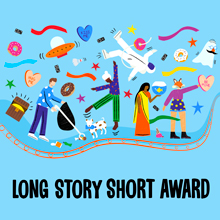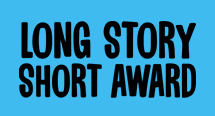She sleeps like a dead weight now beside me, lowered into the night, the ropes of the day swaying around her. We know nothing about each other really. She does not know how often my ex-lover visits me ... [+]
Although wouldn't it be just like a hypochondriac to try and diagnose themselves as a hypochondriac? A medical and philosophical conundrum, to say the least.
My dread of illness began early. I was a voracious reader as a child, and my literary journey included books like The Secret Garden (parents die tragically in a cholera epidemic), Fever (a girl trying to survive the yellow fever outbreak in colonial Philadelphia), and Old Yeller (featuring my ultimate fear, rabies. Please never talk to me about rabies. The word alone is enough to reduce me to a pile of dust). What I remember most from all these books is the mix of dread and fascination I felt towards the illnesses they described, how they stuck with me like body odor to a middle school boy, making a home in my brain when all I wanted was for them to leave. Other children worried about being picked last for kickball in P.E. class. I worried about the Bubonic Plague.
These childhood fears of cholera and yellow fever and the bubonic plague have subsided, replaced by more current (and perhaps more realistic) fears of illnesses like breast cancer, ovarian cancer (very hard to detect, if you didn't know), sudden brain aneurisms, myocarditis, congenital heart defects (a particular horror of mine), blood clots, brain swelling, brain shrinking, clogged arteries, liver failure, kidney stones, meningitis, brain-eating amoebas from getting water up your nose at the lake, fungal infections from wearing your brother's soccer cleats, carbon monoxide leaks (the silent killer), leukemia, sepsis, the adverse reactions featured on the back of medication bottles, Hypothyroidism, anything having to do with the pancreas, which is confusing and mysterious to me, and appendicitis. Not to mention of course, covid-19. Being a hypochondriac in a pandemic is a bit of a shitshow.
There is something vaguely comforting about being the only worried one. I convince myself that I'm on the verge of death at least once a year. It's always helpful to see everyone around me perfectly unconcerned about the state of their body. No one else seems to be constantly scanning for lumps or rashes or aches. When significant portions of the population adopted my conviction that we're all probably dying of a mysterious illness – feeling tickles in their throats, panicking at every stray cough and sneeze, attempting to decipher between allergy symptoms and what may be signs of imminent death, sanitizing their mailboxes, buying inordinate amounts of toilet paper at Costco, and spending hours on Web MD (which will inevitably lead to a fit of despair. I have been banned from Web MD by my mother, who was tired of receiving panicked phone calls about lymphatic cancer) – it was alarming to say the least. I spent much of last year in a cloud of paralyzing anxiety. I was afraid to go to the grocery store. Afraid of getting sick. Afraid of getting other people sick. I broke out in hives almost weekly, angry red splotches inflaming my chest and neck. I hid them with high-necked t-shirts. I wasn't sleeping. I would spend hours awake in the dark, counting sheep and praying and counting sheep again. I sat at the kitchen table every morning, staring at a plate of cold rubbery eggs before throwing them away after a few bites. I felt nauseous almost all the time. I started having heart palpitations because I was so hungry and tired, and the palpitations made me so scared about having a heart attack that I started to have more palpitations about the palpitations. A vicious cycle.
So I called my mother.
And she told me to come home.
We went to the doctor the next morning. My mother came with me to the appointment, which she hasn't done in years. We sat in the waiting room, which smelled of antiseptic cleaner and the floral perfume of the woman sitting next to us. We talked quietly about my little brother, who was going through a growth spurt and had taken to eating entire frozen pizzas for snack before my father put his foot down. We talked about a museum of little "Precious Moments" figurines my mother saw advertised online and how creepy it was. We talked about anything other than the fact that I was absolutely losing my mind.
And then it was time to see the doctor. She was blonde and friendly and wearing a bright red dress with a white coat over top. She asked me to tell her what had been going on.
So I told her everything, as best as I could. And of course tears began to gather behind my eyes and then leak out of me, dripping down into the inside of my mask like raindrops. And the more I said the heavier those tears became, until I was practically weeping as I spoke.
Both my mother and the doctor pretended not to notice that I was crying. They listened and nodded and smiled behind their masks and I will never forget that kindness of ignoring my tears, as if it were perfectly normal to be sitting in a check-up room weeping your eyes out when really nothing seems to be wrong with you, other than always being afraid that something is wrong with you.
The doctor said she thought I had some anxiety issues that needed to be addressed. I felt the raised hives under my shirt and thought, yep, I think so. She prescribed a low-dosage of an anti-anxiety medication and told us we could pick it up at the pharmacy later that day.
No one in my family has ever been on any sort of anti-depressant or anti-anxiety medication before. I had always viewed medicines like that to be for people who were really not okay. And then it became apparent that I was really not okay. And for the first time in my life I had a little orange bottle of white pills with my name on it. I was supposed to take one each morning. So I did, because I wasn't really sure what else to do. And my world didn't change. There were no lightening-strike realizations or personality-altering moments. I still felt anxious and worried about the lumps and bumps littering my body, still used inordinate amounts of hand sanitizer before eating, still had some trouble with my appetite. But little by little the world didn't seem so utterly unmanageable. I slept through the night more often than I didn't. I ate two crispy hash browns from Trader Joe's every morning, twin sizzling brown ovals that I paired with a scrambled egg. I bought sugary vanilla iced coffee from Dunkin' Donuts on my way to work and poured half and half over the top in three generous splashes, and I didn't worry that the caffeine would keep me from sleeping. I would sit in the sunshine outside of that Dunkin' Donuts and close my eyes, letting the warm wash over me and burn the skin on the top of my nose.
And things were better. Not perfect. But better.



